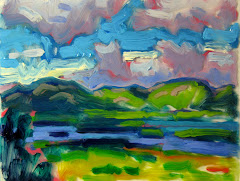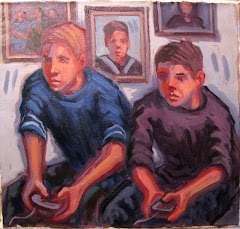Then and Now: War, History and Non-Violence
(paintings on display at the GCTC in Ottawa until January 11, 2010)
A family trip to Poland in the fall of 2006 brought me face to face with the improbability of my own existence. Somehow, my father and grandmother had survived the Nazi occupation of Warsaw, ground zero in the unthinkable rampage of a genocidal war machine. My grandmother's stories about their life during the war, which had always fascinated me as a child, suddenly took on a harrowing immediacy. Many millions were not lucky enough to tell their stories. And many millions more went along with the madness. But if the tendency to display blind obedience to the criminal abuse of power stands as one of humanity's great weaknesses, then surely our ability to follow the voice of conscience must count amongst our greatest virtues. Janusz Korczak followed that voice and chose non-violence in response to overwhelming brutality, providing a powerful symbol that challenges us in our own time. He refused to turn his back on the fate of the innocent and vulnerable but instead shared in their lot. Throughout history, courageous women and men have broken ranks with the violence of so-called civilization, while devastated communities have been rebuilt and ravaged landscapes have been reclaimed. The images I have painted for this show reflect my interest in this history and my hope that we may yet learn from it.
I hope these paintings create some discomfort. For how can you paint a pretty picture of a terrible place? Our historical consciousness should overwhelm our senses. What amount of aesthetic pleasure can the warm light of an autumn afternoon give us in a place like Auschwitz? And if Warsaw and Passchendaele, Vimy Ridge and Flanders fields are beautiful places to see, then how does that beauty co-exist with the memory of the horrors committed there?
I have painted images from the Great War of 1914-1918 – “the war to end all wars”, the First World War, the necessary precedent to the Second. Images of various former hell on earth and one of a Canadian soldier, Private Harold Lodge, who was shot at dawn for refusing to kill or be killed in the mud at Passchendaele. The bullet he took in the neck for king and country the year prior didn't get him much credit with the men who found his later desertion a capital crime, the same men presiding over the endless slaughter on the front lines.
The images of Warsaw in ruins, forming the backdrop to scenes from the play and from my own family history stand in stark contrast to the new medieval city that greets today's visitor, rebuilt from the utter rubble that the Nazis left behind. No doubt too, when great games have finally ceased, the Iraqis, the Afghans, the Gazans will rebuild their homes, perhaps helped by those from within the societies that brought destruction upon them. Brave young people like Rodney Watson, Kimberley Rivera, Robin Long and Joshua Key – Iraq war resisters from American ranks, come to Canada for reasons of conscience. Some deported back to the United States and jailed. Others still awaiting their fate. Or Travis Bishop, a veteran of the Iraq invasion, but sentenced in August 2009 to a year in prison under the new hope and change regime for refusing to deploy to Afghanistan. Or Omer Goldman, Raz Bar-David Varon and Udi Nir, three of the Shministim, Israeli youth jailed for refusing to kill or be killed in Gaza. Agree or disagree with their positions, but respect the courage of their convictions and the nature of their refusal to take up arms. Given the means of destruction in the hands of willfully blind and angry men, their acts of conscience are nothing less than hope for the very survival of the species.
I dedicate these paintings to the new generation, to my nephew and nieces: Lucas, Julia and Sadie K. I wish for you what my Babcia wished for me and for your fathers, that we never know war. And I add to that my own wish, that you never be seduced by those who plan for war, those who sell it and those who profit from it.
Marc-André Brzustowski
Thursday, November 19, 2009
Subscribe to:
Post Comments (Atom)


1 comment:
Wonderful words about paintings, and powerful paintings and words about our history, present and future. Have you contacted any of the people you are honouring so that they can see the line you are drawing (painting) from them to their brothers and sisters in earlier wars? I'm sure they would be moved to be recognized in this way.
Post a Comment